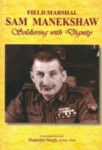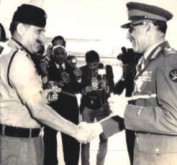|
Obituary
Farewell to a War Hero
 |
Field Marshal Sam Manekshaw |
India's first Field Marshal, the legendary 94-year old Sam Manekshaw, considered one of the country's greatest war heroes, died in a military hospital in Tamil Nadu. The Padma Vibhushan and Military Cross recipient had developed 'acute bronchopneumonia with associated complications'. He was placed under intensive care since he slipped into a coma four days before his death.
Manekshaw joined the Indian Military Academy in 1932.
Field Marshal Sam Hormusji Framji Jamshedji Manekshaw was born in Amritsar, Punjab on April 3 1914. After completing his schooling in Amritsar and Sherwood College (Nainital), he joined the first batch of 40 cadets at Indian Military Academy (IMA), Dehra Dun on October 1, 1932. He commenced from the IMA in December 1934 and was commissioned as a Second Lieutenant in the Indian Army. He held several regimental assignments and was first attached to the Royal Scouts and later to the 12 Frontier Force Rifles. During World War II, he saw action in the Burma campaign on the Sittang River and had the rare distinction of being honoured for his bravery on the battlefront itself. During World War II, he led a counter-offensive against the invading Japanese Army in Burma.
 Manekshaw showed acumen for planning and administration while handling the issues related to partition in 1947, and later put to use his battle skills during the 1947-48 Jammu and Kashmir Operations. After his command of an infantry brigade he was posted as the Commandant of the Infantry School and also became the Colonel of 8 Gorkha Rifles (his regimental home) and the 61st Cavalry. He commanded a division in Jammu and Kashmir and a corps in the Northeast, with tenure as Commandant of Defence Services Staff College (DSSC) in between. As GOC-in-C Eastern Command, he handled the tricky problem of insurgency in Nagaland and the grateful nation honoured him with a Padma Bhushan in 1968. Manekshaw showed acumen for planning and administration while handling the issues related to partition in 1947, and later put to use his battle skills during the 1947-48 Jammu and Kashmir Operations. After his command of an infantry brigade he was posted as the Commandant of the Infantry School and also became the Colonel of 8 Gorkha Rifles (his regimental home) and the 61st Cavalry. He commanded a division in Jammu and Kashmir and a corps in the Northeast, with tenure as Commandant of Defence Services Staff College (DSSC) in between. As GOC-in-C Eastern Command, he handled the tricky problem of insurgency in Nagaland and the grateful nation honoured him with a Padma Bhushan in 1968.
 Manekshaw became the 8th Army Chief when he succeeded General Kumaramangalam on June 7, 1969. His years of military experience were soon put to the test as thousands of refugees from the erstwhile East Pakistan started crossing over to India to form the Mukti Bahini. The volatile situation got worse and soon erupted into a full-scale war in December 1971. During the military campaign, Manekshaw showed an uncommon ability to motivate the forces, coupling it with a mature war strategy. The war ended with Pakistan's unconditional surrender to the allied forces consisting of Bangladeshi Freedom Fighters and the Indian Army. More than 90,000 Pakistani soldiers were taken as POWs. Manekshaw became the 8th Army Chief when he succeeded General Kumaramangalam on June 7, 1969. His years of military experience were soon put to the test as thousands of refugees from the erstwhile East Pakistan started crossing over to India to form the Mukti Bahini. The volatile situation got worse and soon erupted into a full-scale war in December 1971. During the military campaign, Manekshaw showed an uncommon ability to motivate the forces, coupling it with a mature war strategy. The war ended with Pakistan's unconditional surrender to the allied forces consisting of Bangladeshi Freedom Fighters and the Indian Army. More than 90,000 Pakistani soldiers were taken as POWs.
The President of India awarded him a Padma Vibhushan in 1972 and conferred upon him the rank of Field Marshal on January 1, 1973. Manekshaw became the first Indian General to be awarded this prestigious rank, which is mainly honorary. Manekshaw retired a fortnight later, on January 15, 1973, after completing nearly four decades of military service.
Copyright (R) thedailystar.net 2008 |
